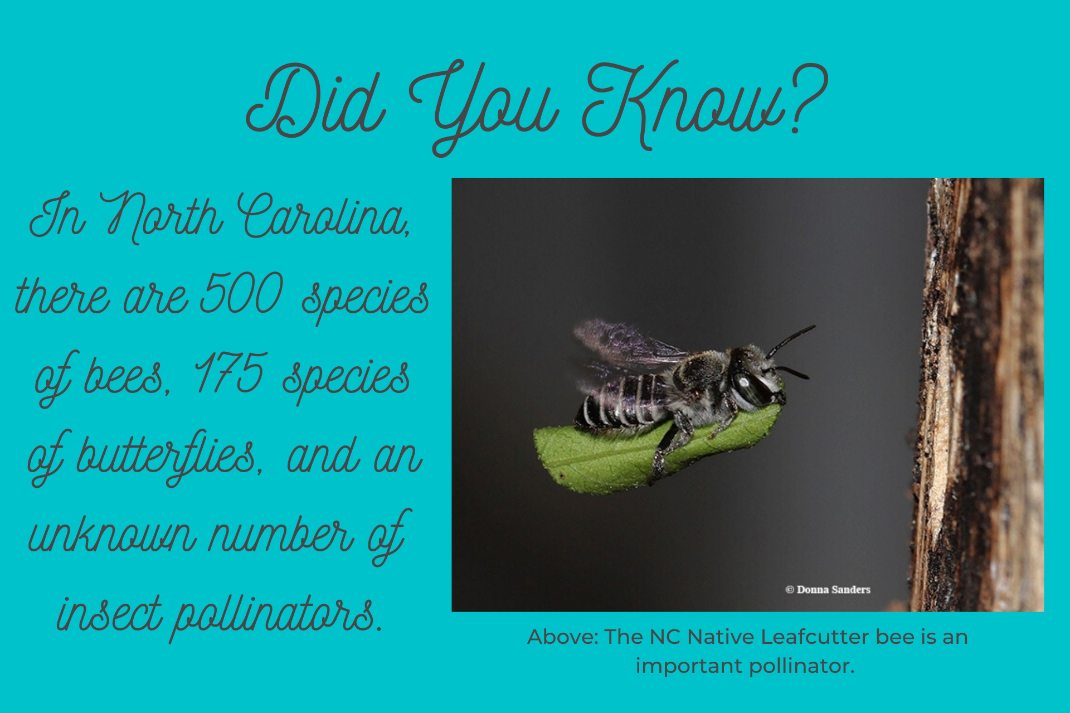 | Learn to Love the River Discover what makes the French Broad River so special and learn about the many ways it connects our community. | | | | | | | | | | | | What do bees, butterflies, and birds have in common? They all fly and they pollinate plants! In this issue we’ll learn about pollinators and how they help keep our streams and ecosystems healthy. We hope you enjoy and learn something new! | | | | Why are Pollinators Important? | | | | We have a lot to thank pollinators for, including apples, strawberries, and even chocolate! Most flowering plants rely on birds, butterflies, bees, bats, and other pollinators so they can produce fruits and seeds. Many other animals also depend on those fruits and seeds as essential parts of their diet. Without pollinators like bees spreading pollen from plant to plant, humans and wildlife wouldn’t have the abundance of food options we have today! In the video Why Protect Pollinators, The California Academy of Sciences explains why pollinators are so important to plants, ecosystems, and humans, and shares some ways we can help them. Watch the video by clicking the button below. Many trees and plants near waterways also use the help of pollinators to reproduce, and the pollinating insects can be a big part of the diet for aquatic wildlife. Healthy wild plant populations means we have less sedimentation in our rivers, better stormwater management with plants that can soak up the water, and less pollutants in the water as plants filter them out! Pollinators are a big part of having those healthy plants. For more information check out this article from Clear Choices and Clean Water. | | | | | | | | NC Pollinators and Plants | | | | North Carolina residents depend on a variety of pollinators for food crops and ecosystem biodiversity. Our state provides a home to many different native pollinators, including bees, flies, wasps, butterflies, beetles, moths, and hummingbirds. Native pollinators both rely on and contribute to the biodiversity of plant life. Native bees are especially susceptible to habitat loss because they are so heavily dependent on the diversity of plant life, whereas other pollinators may have multiple sources of food such as insects. According to the Natural Resource Council, we have seen a decline in native pollinator species due to factors such as habitat loss, degradation and fragmentation; diseases and parasites, and pesticide exposure. | | | | | |  | | | The best way to support our native pollinators and protect them from population decline is to plant native pollinator plants! It is also important that we reduce and even eliminate the use of toxic chemicals and fertilizers. By taking these steps, we can promote the vitality of our native plants and pollinators. Other helpful actions include putting native plants along stream banks. These native plants provide a food source for pollinators, ensure a riparian buffer and reduce sedimentation, flooding, and improve water quality and biodiversity. Some of our favorite native pollinator plants include Bee Balm, Wild Indigo, Mountain Mint, and Rattlesnake Master. For more information about native pollinator plants and when to plant them, check our NC State’s list of “Top 25 Native Pollinator Plants for North Carolina”. The Asheville Museum of Science also put together a video on local pollinators for their Daily Dose of Science series. You can watch it by clicking the button to the left! | | | | | | Pollinator Gardens and Celebrations | | | | As we mentioned above, installing native plants is a great way to support pollinators and healthy ecosystems! This can be especially important in urban areas where there is often less green space. You can do this by making pollinator gardens in your own yards or in a community garden. These gardens will provide habitat for pollinators and wildlife while also providing food for yourself and your local communities. Check out this video for a great way to repurpose a kiddie pool as a raised pollinator garden bed, and make sure to watch the video below featuring William Moss, a master gardener with the National Gardening Association, as he explains some great tips for gardening with pollinators in mind. | | | | | | | | This year is the 8th Annual Pollination Celebration hosted by Asheville Greenworks, home of Bee City USA - Asheville. This celebration runs through the entire month of June and includes a pollinator photo contest, plenty of resources and information on pollinators, and zoom workshops on creating pollinator gardens! You can check out all of those resources here on the Asheville Greenworks website. Bee City USA - Hendersonville is also hosting activities like plant sales, pollinator garden tours, online resources and gardening classes, and a photo contest. Let’s celebrate pollinators and all they do! | | | | | | A Little Dose of Inspiration Lallie W., a 6th grade student at French Broad River Academy - Girls, won 1st place in the Poetry and Writing category for 6th - 8th grade in our 2020 Voices of the River Art & Poetry Contest. | |  | Lady Green
She has a mouth,
But never speaks.
She always runs,
But never walks.
She is always on the go,
Never stopping.
Her style
Leaves the mortals of this world around her
Mesmerized.
The silkiness of her movement-
So effortlessly she does it.
The rocks are her scars;
Bandages can’t fix her.
Her fists pound water,
Waves crash.
When she is upset,
She rages.
She has clandestine meetings
With the world around her.
Lady Green:
The bidarka’s are jewels of her crown.
The mist of her breath
As ethereal as a ghost.
Her loving hand;
A kind ecosystem.
The flow of her movement calms me,
Like a lullaby.
Once she leaves you,
She never returns. -Lallie W. | | | | Staying connected to the river and each other. We are thinking of you all in these uncertain times and hope you are staying healthy and safe! Thanks to your generous support we are able to continue our Education, Water Quality and Land Conservation programs, but we couldn't do it without you! | | | | | | | | | | | |